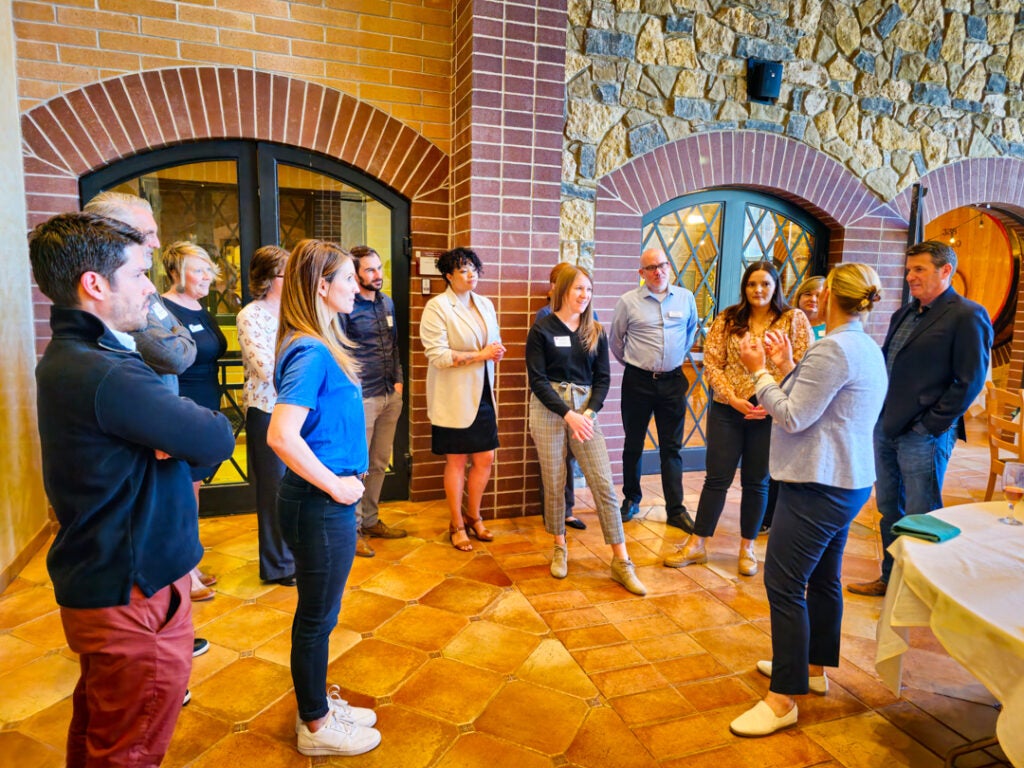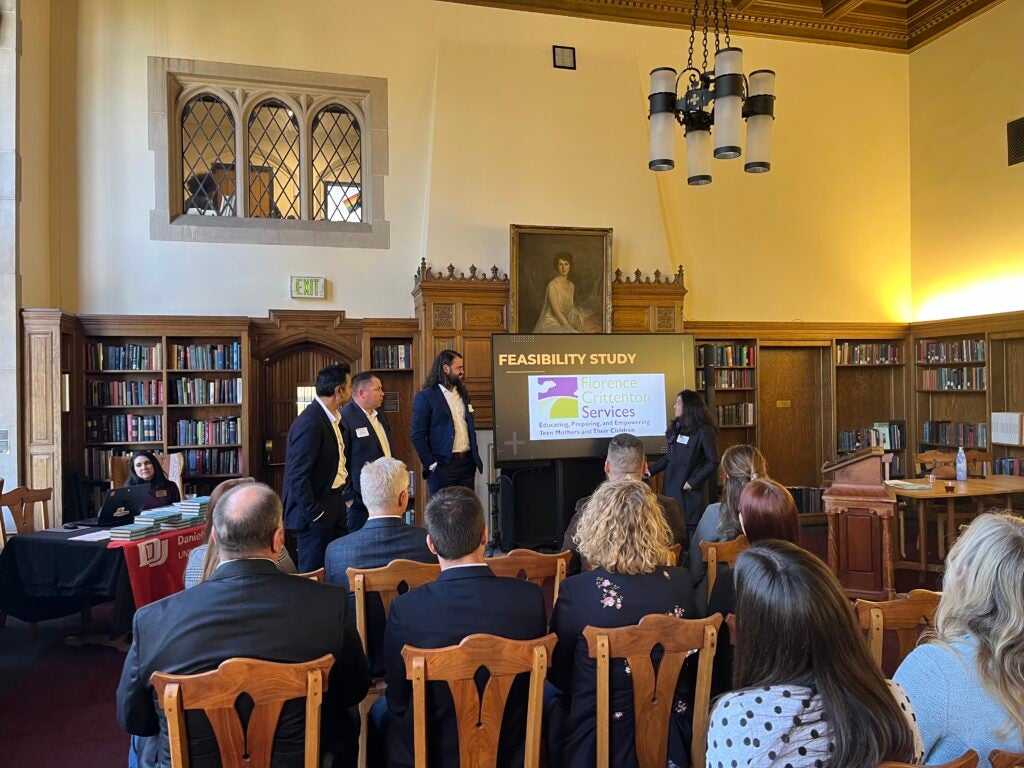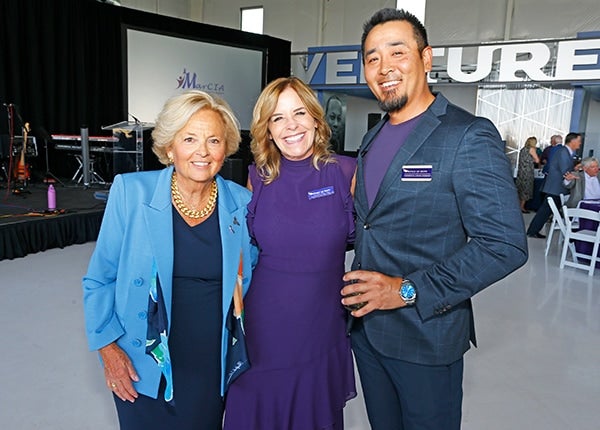‘Class Project’ Becomes Passion Project for Executive MBA Alum
The Social Impact Project returns to the EMBA curriculum post-COVID

In front of a sold-out, 320-person crowd in a cavernous airplane hangar, Colin Daugherty walks to a glass lectern.
“Woohoo!” he says, grinning shyly, as he kicks off the latest phase of a project he began nearly five years ago, as a student at the Daniels College of Business.
The Evening of Hope is Colorado’s biggest event of the year for pancreatic cancer fundraising—a night of mourning, but also of celebration and optimism. Daugherty isn’t a doctor or a researcher, or even a fundraiser by trade. He doesn’t have a heartbreaking story of a friend or relative who has been afflicted by the deadly disease.
But on this night, he is a willing, enthusiastic emcee, looking as calm and comfortable as his attire: a navy blue blazer with a windowpane pattern, well fitted over a purple t-shirt.
It’s a pretty impressive position for someone who, until a few years ago, knew nothing about pancreatic cancer. He certainly had never heard of Wings of Hope, the region’s leading supporter of pancreatic cancer research.
What started as an assignment in the Daniels Executive MBA program has become a large part of Daugherty’s purpose and passion. He now sits on the nonprofit’s board of directors.
“It was very unusual for someone [like Colin] to gravitate toward the nonprofit, because a volunteer nonprofit is usually just people who feel passionately and have lost someone [to cancer] or are going through it themselves,” said Maureen Shul, founder and CEO of Wings of Hope. “He came in on that level of no direct emotional connection, but that grew. He has interacted with patients, with people. In the beginning he had no personal connection, but I think that has changed.”
A steppingstone to success
Daugherty came to the Daniels College of Business in 2017, an Army veteran and a well-regarded expert in security and risk on a local, national and global scale. For years, he had served in the military and law enforcement sectors, but now Daugherty was looking for a safer way to make a larger impact.
The Executive MBA was a chance to take his real-world experience and translate it into something he could use in the corporate landscape.
“My true missing piece, if I wanted to transition into the business world, was I didn’t have anything that could be recognized as an official business value,” he said. “The EMBA seemed to be that official steppingstone.”
At Daniels, Daugherty found what he was looking for. The cohort model provided support and connections. He gained a better understanding of his leadership and communication style through Insights Discovery, a psychometric tool developed by psychologist Carl Jung. An overseas immersion and an infamous sailing challenge in San Diego shaped his view of the business world.
But his trajectory really changed with the program’s Social Impact Project, which gives students the chance to work directly with a local nonprofit and help it address its needs.
Business for the public good
The Executive MBA Social Impact Project is a capstone of sorts. Students offer their time and business acumen, developing milestones, an execution timeline and metrics to track their success. Nonprofits receive solutions for pressing issues while EMBA students develop into purpose-driven professionals, said Andy Cohen, the program’s faculty director.
“This is part of the Daniels mission of doing business for the public good,” Cohen added. “This is another way to bring the business and public together.”
After a brief, COVID-necessitated hiatus, the Social Impact Project has returned, this time as a course for credit. Jenny Dobmeier (MBA 2006), a teaching assistant professor, volunteered to lead a revamped offering, inspired by a personal search for purpose-driven work and fulfillment.
“Offering your time and talent to organizations aligned with your values is intensely rewarding,” Dobmeier said. “Structuring a time and talent commitment for our students and including reflections on how they can evaluate their business decisions through a social impact lens allows us to create a larger impact in our communities.”
In order to relaunch the Social Impact Project, Dobmeier spent months developing connections in the nonprofit community through the EMBA alumni network and the College’s community partners. Using feedback from the nonprofits she spoke with, Dobmeier forged a proposal process to ensure the scope of the projects are strategic enough and robust enough to be completed in six months.
“The Daniels College of Business is internationally recognized for integrating social and ethical considerations into our curriculum and the EMBA program focuses on the complex and evolving issues leaders face in today’s business environment,” Dobmeier said. “The social impact project is an important capstone of the program in alignment with the mission of the college. The students’ engagement not only benefits the organizations they work with, but also demonstrates the standard of authentic leadership at the core of the Daniels College of Business.”
The assignment is structured like a consulting project: Student teams meet with their nonprofit partners and complete work on their deliverables entirely outside of the classroom. Dobmeier does her best to structure things so that student teams can balance the workload—after all, EMBA students are also working in their professions while taking two other courses. Special office hours during in-person class days provide a chance to check in and address any challenges.
The project begins with a nonprofit showcase, where organizations share their missions and the places in which students can best assist them over the next six months. This year, Cohort 79 worked with organizations like A Precious Child, the Rocky Mountain MS Center, CASA, Florence Crittenton Services and SVP Denver.
Florence Crittenton, a Denver nonprofit that educates, prepares, and empowers teen mothers and their children, was looking for help executing its long-term vision. The organization approached students and asked them to create a strategic market analysis and a business plan—critical components for launching experiential opportunities for financial education and workforce skills.
“The last five months have been transformative,” said Rohan Khare, an Executive MBA student. “They have instilled in me a sense of purpose and a determination to integrate social good into my professional and personal life. The journey with Florence Crittenton was hopefully just the beginning, and I am excited about the path ahead.”
Testing, learning, growing
In 2018, Daugherty remembers several veteran-related organizations delivering pitches to his cohort. But, despite his background, something else caught his eye.
“If I wanted to do something that was low-hanging fruit, I would have just gone with the veterans group and it would have been just hanging out with people I already know,” he said. “[But] I did the EMBA program to radically pivot and advance my career objectives and professional development. I wanted to test myself; I wanted to grow; I wanted to learn. This presented itself as an opportunity to actually be engaged, get the hands dirty in something I knew nothing about.”
So Daugherty instead gravitated toward the Kingsbury Open, a golf tournament operating with a lofty mission and limited resources. The day of the showcase, Shul remembered, she was looking for a way to more explicitly link the tournament to Wings of Hope, the nonprofit she created after the deaths of her mother and brother.
Daugherty came on board and immediately put his organizational and leadership skills to work, Shul said.
“He could see a situation and break it down and give us a strategy for making that situation better—whether it was our events or our social media, the interview process or comments on grant applications—using experience and common sense,” she explained. “We live in a world where people don’t care what they do, so to find someone who not only cares but has an intelligence and an expertise that they can apply to something like a nonprofit was exciting and enhancing.”
Over the next six months, Daugherty helped implement a strong organizational structure. He proposed what Shul described as “novel ideas” that elevated the Kingsbury to the most popular golf tournament in Colorado.
Continuing the work
The Social Impact Project concluded that fall, but the relationship between Daugherty and Shul was just beginning. The two stayed in touch and took their partnership beyond the golf tournament. Soon Daugherty was integrated into the Wings of Hope team, talking with cancer researchers and lending his perspective to high-level conversations.
“I was sitting in board meetings with world-renowned doctors and heads of CU-Anschutz; I’m saying things and these people are taking notes!” Daugherty said, laughing. “I’m pinching myself; I have total imposter syndrome. But it really became such a validation that what I was doing with the EMBA and pursuing stretch opportunities was right. Ever since then, my engagement with them has been rock solid.”
One year later, Shul asked the now-graduate to join the board at Wings of Hope. Daugherty accepted.
The nonprofit has flourished. After that initial boost from the Kingsbury Open, Wings of Hope has grown to a place where it can distribute six-figure grants to cancer researchers. Shul regularly presents her work at conferences and other hospitals.
The organization’s Evening of Hope gala raised an additional $50,000. Shul also announced that a Wings of Hope-supported project would be starting its first-phase human efficacy trials.
Collaborating with Wings of Hope has given Daugherty energy that he has carried over to his professional life. In addition to his work as founder and CEO of Evo Consulting & Operations, Daugherty volunteers on several security-centric boards and committees.
The EMBA—and its Social Impact Project—laid the groundwork for his growth as a leader, he said. It’s why he’s proud that a key component of the program’s “benevolent legacy” has returned.
“Take [the project] as a stretch opportunity to engage with a group and learn something you know nothing about,” Daugherty said. “When else in your adult life are you going to have the opportunity to have six months of deliverable-focused time with an organization?
“For the people who say they are leaders of this or that, it’s a great opportunity to put your money where your mouth is.”












